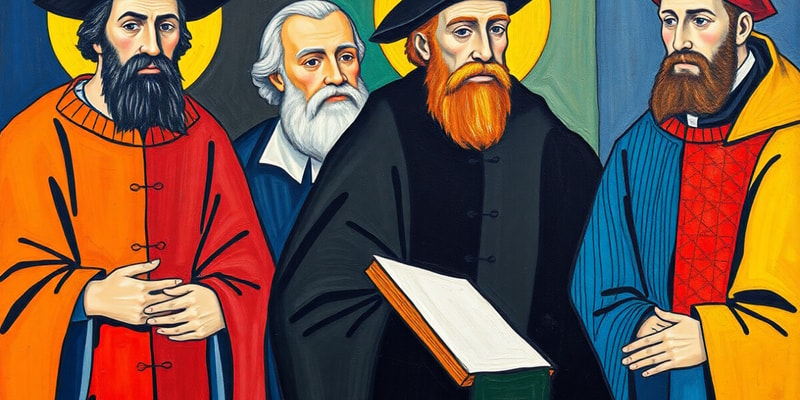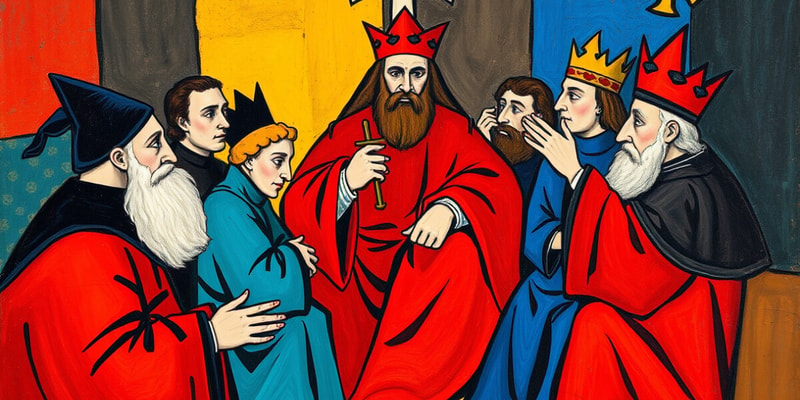Podcast
Questions and Answers
Match the key figures with their contributions:
Match the key figures with their contributions:
Martin Luther = Initiated the Protestant Reformation by posting the Ninety-Five Theses John Calvin = Developed the doctrine of predestination Bartolomeu de Las Casas = Advocated for the rights of indigenous peoples Our Lady of Guadalupe = Symbolized indigenous identity and Catholic faith in Mexico
Match the individuals to their geographic influence:
Match the individuals to their geographic influence:
Martin Luther = Germany John Calvin = Switzerland Bartolomeu de Las Casas = The Americas Matteo Ricci = China
Match the key figures with their religious roles:
Match the key figures with their religious roles:
Martin Luther = Theologian and monk John Calvin = Reformer Matteo Ricci = Jesuit missionary Pope Clement XI = Papal authority in religious matters
Match the contributions to their societal impacts:
Match the contributions to their societal impacts:
Signup and view all the answers
Match the controversies with the respective individuals:
Match the controversies with the respective individuals:
Signup and view all the answers
Match the figures with their historical context:
Match the figures with their historical context:
Signup and view all the answers
Match the individuals with their historical actions:
Match the individuals with their historical actions:
Signup and view all the answers
Match the religious figures with significant events:
Match the religious figures with significant events:
Signup and view all the answers
Match the figures with their ideologies:
Match the figures with their ideologies:
Signup and view all the answers
Match the historical figures with their associated movements or philosophies:
Match the historical figures with their associated movements or philosophies:
Signup and view all the answers
Match the scientists with their major contributions or theories:
Match the scientists with their major contributions or theories:
Signup and view all the answers
Match the philosophers with their key works or ideas:
Match the philosophers with their key works or ideas:
Signup and view all the answers
Match the historical figure with the century they were prominent in:
Match the historical figure with the century they were prominent in:
Signup and view all the answers
Match the key contributions with their respective historical figures:
Match the key contributions with their respective historical figures:
Signup and view all the answers
Match the philosopher with their perspective on government:
Match the philosopher with their perspective on government:
Signup and view all the answers
Match the scientific figures with their notable scientific methodologies:
Match the scientific figures with their notable scientific methodologies:
Signup and view all the answers
Match the significant ideas with their proponents:
Match the significant ideas with their proponents:
Signup and view all the answers
Match the historical figures with their origins or backgrounds:
Match the historical figures with their origins or backgrounds:
Signup and view all the answers
Study Notes
Major Reformers and Thinkers of the 16th-18th Centuries
-
Martin Luther: Initiated the Protestant Reformation in 1517 by posting Ninety-Five Theses. Criticized the Catholic Church, especially indulgences, advocating salvation by faith alone. Led to Protestant denominations and weakened the Catholic Church.
-
John Calvin: Prominent Protestant Reformer. Key doctrine was predestination: God's predetermined choice of the saved and damned. Influenced Reformed Christianity, especially in Switzerland, Scotland, and parts of France.
-
Bartolomeu de Las Casas: Spanish priest who advocated for indigenous rights in the Americas. Initially involved in the encomienda system, but later opposed native mistreatment. His writings led to colonial reforms, although he also supported African slavery.
-
Our Lady of Guadalupe: Catholic religious symbol in Mexico. Tradition holds she appeared to Juan Diego in 1531, becoming a symbol of indigenous identity and faith, uniting Mexican culture and spirituality.
-
Matteo Ricci: Italian Jesuit missionary in China. Fought to integrate into Chinese society and learn the language. Adapted Catholic teachings to Chinese culture, respecting traditions and incorporating Confucian principles. This strategy helped his mission gain influence.
-
Pope Clement XI: Instrumental in the Rites Controversy concerning Jesuit missionary work in China. Initially supported Jesuits but later criticized their accommodation of Chinese traditions, like ancestor worship, causing conflict.
-
Emperor Kangxi: Fourth Qing Dynasty emperor (r. 1661-1722). His reign featured stability, expansion, and cultural flourishing, with a tolerant view toward Christianity, allowing Jesuit missions.
-
Abd al-Wahhab: 18th-century Islamic scholar who founded the Wahhabi movement. Advocated for a purer form of Islam, rejecting innovations and practices not adhering to Prophet Muhammad's teachings. Shaped Saudi Arabia's development and its interpretation of Islamic law.
-
Wang Yangming: Ming Dynasty philosopher who emphasized "mind" (xin) as fundamental to morality. Challenged Confucian orthodoxy by highlighting intuitive knowledge, proposing an inherent ability to discern right and wrong in all people.
-
Guru Nanak: Founder of Sikhism (1469). Rejected caste systems, promoting equality and devotion to one God. His teachings established Sikhism, stressing truth, meditation, and service to humanity.
Scientists and Philosophers of the Scientific Revolution and Enlightenment
-
Nicholas Copernicus: Polish astronomer. Formulated the heliocentric model, placing the Sun, not Earth, at the center of the universe. His work laid the foundation for the Scientific Revolution.
-
Johannes Kepler: German astronomer who built on Copernicus's ideas. Discovered the laws of planetary motion, demonstrating elliptical orbits instead of circular ones, and how planetary speed changes with proximity to the sun.
-
Galileo Galilei: Italian astronomer and physicist. His telescope discoveries, like Jupiter's moons and Venus's phases, supported the heliocentric view. His support for these ideas led to a conflict with the Catholic Church.
-
Isaac Newton: English mathematician and physicist. Formulated the laws of motion and universal gravitation. His work synthesized past discoveries, creating a comprehensive framework for understanding the physical world.
-
Voltaire: French Enlightenment philosopher advocating civil liberties (freedom of religion, speech). Criticized the French monarchy and the Catholic Church, supporting reason, secularism, and individual rights. His writings influenced modern thought.
-
Mary Wollstonecraft: English writer advocating women's rights and gender equality. Her famous work, "A Vindication of the Rights of Woman", challenged traditional gender roles, advocating education and opportunities for women.
-
Jean-Jacques Rousseau: French philosopher influenced by the French Revolution. Stressed the "general will" of the people as the basis for government (The Social Contract). Believed in inherent human goodness and direct democracy.
-
John Locke: English philosopher and political theorist. Influenced liberal political thought. "Two Treatises of Government" argued for government as a social contract, based on natural rights to life, liberty, and property. His ideas were foundational for democracy and constitutional government.
Studying That Suits You
Use AI to generate personalized quizzes and flashcards to suit your learning preferences.
Description
Test your knowledge on the influential reformers and thinkers of the 16th to 18th centuries. This quiz covers figures like Martin Luther and John Calvin, their contributions to religious thought, and the impact of Bartolomeu de Las Casas. Explore how these historical actors shaped modern religious and cultural landscapes.




